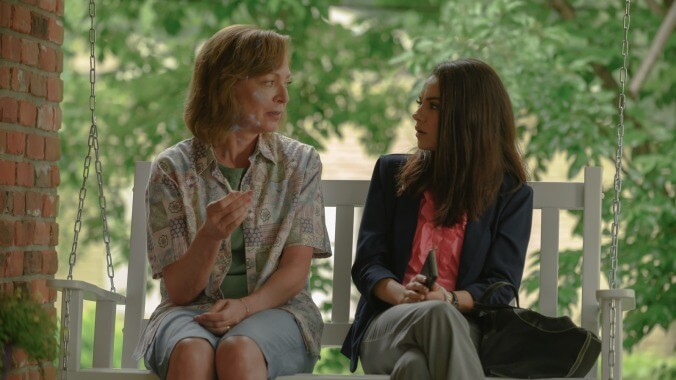Both maudlin and cruel, Breaking News In Yuba County deserves no special bulletin


Note: The writer of this review watched Breaking News In Yuba County on a digital screener from home. Before making the decision to see it—or any other film—in a movie theater, please consider the health risks involved. Here’s an interview on the matter with scientific experts.
It’s a tricky thing, trying to figure out where Breaking News In Yuba County went wrong. The ingredients promise a comedy that, at worst, should be far from dull. There’s a cast top-lined by Allison Janney and Regina Hall, a formidable duo. There’s Amanda Idoko’s screenplay, which spent a couple of years on the Black List; it’s appealingly spiky in some places and promisingly (if precariously) convoluted in others. There’s the rest of the ensemble, a roster of names all but guaranteed to spark some interest, especially in proximity to each other: Wanda Sykes and Ellen Barkin, Awkwafina and Matthew Modine, Juliette Lewis and Bridget Everett, Dominic Burgess and Mila Kunis. Yet none of the curious friction of its story, nor in its cast, results in any sort of frisson of excitement, dread, or even shock. The best Yuba can inspire is indignation. You get all these folks together, Tate Taylor, and the end result is this?
If feeling generous, one might cede some frustration with Yuba to bad timing: Director Taylor would very much like his audience to sympathize with Sue Buttons (Janney), but that’s a hard sell right now. A weary, overlooked suburban housewife, Sue meets another birthday with some recorded affirmations and a grim determination to make the day a good one. The world has other ideas. It’s not just that bad things happen—she buys her own custom cake, her sister (Kunis) and terrible coworkers all forget the day entirely, and she finds out her husband (Modine) is having an affair with a shouty blonde (Everett)—but that they happen about as badly as possible. The cake’s all wrong. Her sister is both forgetful and dismissive. Her husband, well. It’s time for him to go “missing,” a development that looks likely to give Sue the very thing she most wanted for her birthday: attention. Then chaos rips through the town like a spiderwebbing fracture through glass, with sad Sue as its locus and an unconvinced detective (Hall, always engaging but wasted here) following the cracks.
Getting on board with Sue as a sympathetic figure is a feat Taylor can’t pull off. It’s a shame, because as premises go, “middle-aged white lady wreaks havoc on community by prioritizing her own feelings of mistreatment over all else” should be a potent one for this particular moment (or any moment, really). And that is unquestionably the story being told, with Janney shuffling through the firestorm Sue unwittingly sets off as she aims to give the local news media, particularly a sob-story maven played by Lewis, another grief-stricken star. But it seems Taylor, reunited with Janney for the first time since The Help, doesn’t know what to make of his protagonist. In one moment, the film will be having a laugh at Sue’s expense—her unappealing but sensible footwear, her clumsy lies, or simply her—and in the next, working overtime to elicit the audience’s sympathy. The film interests itself in Sue the amoral, selfish, unintelligent frump, and in Sue the lonely, overlooked woman who craves love and attention. Never does it seem to be interested in the character as someone who’s both Sues at once. It’s contempt without dissection, and pity without heart.
The fine cast deserves better. Taylor, apparently unaware that he secured Allison Janney for the lead role, spoon-feeds his audience the emotions he assumes they’ll feel, rather than simply trusting in an accomplished performer’s ability to draw out that reaction. Taylor opts for sympathy; Janney, at least, understands that empathy’s far more useful. It’s occasionally difficult to buy into the notion that Sue’s a bit dim, as Janney doesn’t quite mask her own crackling intelligence. Otherwise, it’s a performance that almost counterbalances the film’s overall lack of curiosity and complexity by virtue of physical specificity and emotional subtlety. Almost.
Despite her admirable efforts, Janney’s performance can’t cover all manner of sins, but much of the rest of the cast fares better, perhaps because the sprawling nature of the story means they all have far fewer sins to cover. Of the performers scattered across the interconnected subplots, it’s Jimmi Simpson (Westworld), as Sue’s brother-in-law, and Samira Wiley (Orange Is The New Black and The Handmaid’s Tale) who fare best. The latter in particular excels, anchoring the film’s best scene, a genuine surprise in a movie that has precious few, and far fewer than it would have you believe. Sue’s maelstrom finally reaches her suspicious, very pregnant sister-in-law in the form of a home invasion, a sequence that bolts toward a climax that’s as startlingly violent as it is unexpectedly funny. Wiley commits fully to the terror of the altercation and the blackness of the humor. In that moment, we get a clearer sense of the Yuba County that might have been: a sharp, bloody dark comedy rooted in both emotional honesty and absurdity. No hand-holding required.